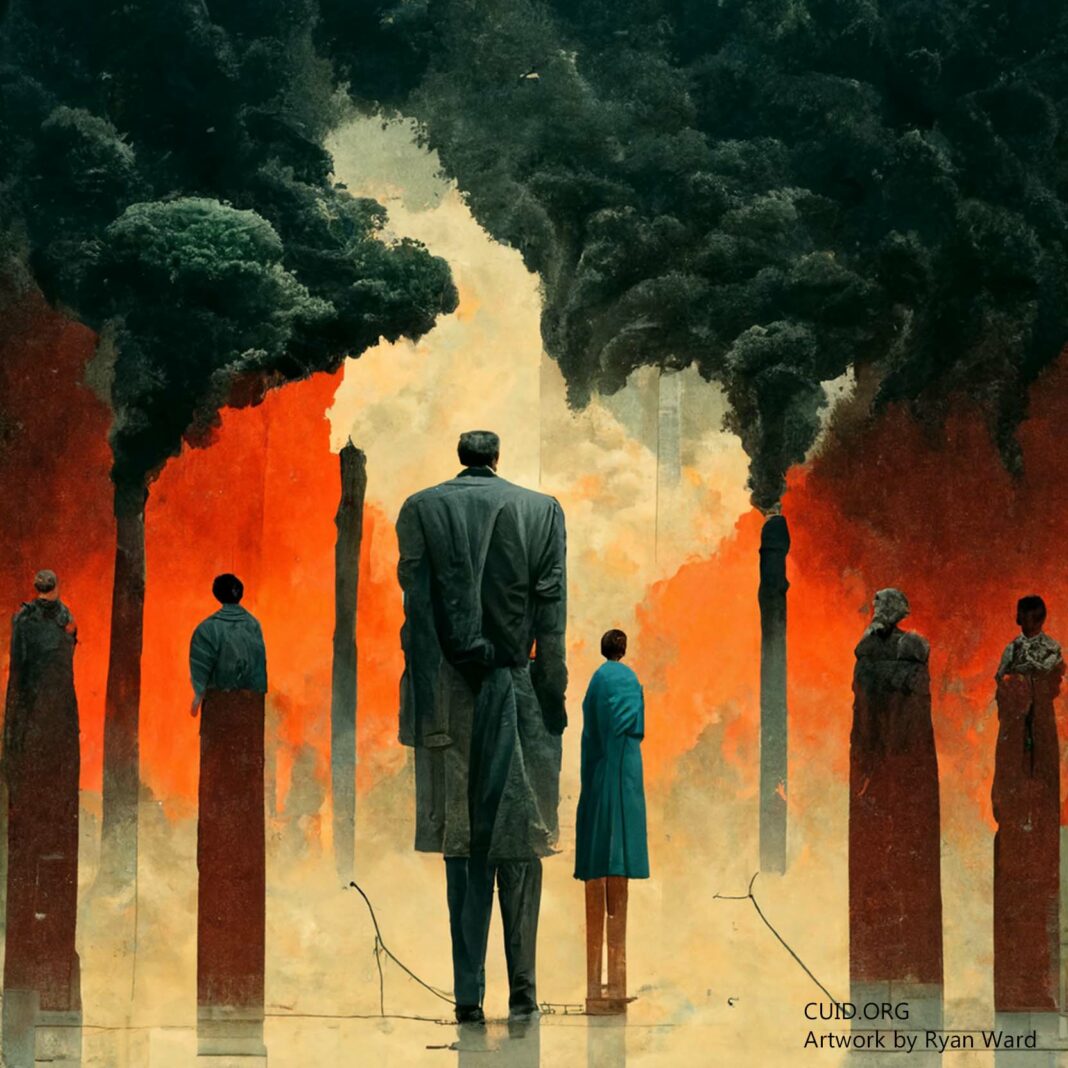Published: Lottie Elton and artwork by Ryan Ward.
The demand that individuals everywhere ‘do their bit’ to help mitigate the climate crisis is, in many ways, a positive and inspiring one. As Swedish climate activist Greta Thunberg declares, “no one is too small to make a difference.” However, the oft-asserted demand that everyone ‘do their bit’ can have insidious implications, suggesting that the predominant agent of change is the individual. By inference, this absolves the governments and corporations who are most responsible for clima te change and most capable of lessening its impact. It also obscures the variable responsibility that different countries have for the climate catastrophe. Due to their position of historical subjugation, countries in the ‘Global South’ are left vulnerable against a change they themselves did not significantly contribute to. Conversely, the ‘Global North’ will be for a time insulated against the crisis that it has precipitated, as its citizens continue to consume on a level unimaginable elsewhere. The concept of climate justice demands that governments and corporations accept culpability, and so challenges the narrative that places blame on all individuals equally. To suggest that climate justice is focused mainly on ‘individuals everywhere’ is to depoliticise and decontextualize it, and to make it amenable to status quo powers.
te change and most capable of lessening its impact. It also obscures the variable responsibility that different countries have for the climate catastrophe. Due to their position of historical subjugation, countries in the ‘Global South’ are left vulnerable against a change they themselves did not significantly contribute to. Conversely, the ‘Global North’ will be for a time insulated against the crisis that it has precipitated, as its citizens continue to consume on a level unimaginable elsewhere. The concept of climate justice demands that governments and corporations accept culpability, and so challenges the narrative that places blame on all individuals equally. To suggest that climate justice is focused mainly on ‘individuals everywhere’ is to depoliticise and decontextualize it, and to make it amenable to status quo powers.
The representation of climate justice as demanding a universal reduction in individual emissions is simultaneously too broad and too narrow. Suggesting that ‘individuals everywhere’ decrease their carbon footprint assumes a unified category of individuals, homogenous in their culpability for the climate crisis. Climate justice actively opposes such a perception, challenging the notion that an all-encompassing ‘humankind’ has “generated a single human footprint.”[1] In their book The Shock of the Anthropocene, Christophe Bonneuil and Jean-Baptiste Fressoz criticise this dominant climate-crisis narrative for “presenting an abstract humanity uniformly involved – implying uniformity of blame.” [2] The focus on the ‘individual’ is also too narrow, as climate justice transcends the individual, and places the onus of redistributive fairness on international actors. In This Changes Everything, Naomi Klein articulates such a perspective: “this is a far more expansive vision than the familiar eco-critique that stresses smallness and shrinking humanity’s impact or “footprint.” That is not an option today; we must use our institutions to act.” [3] Narratives that emphasise individual efforts can contribute to the depoliticization of global warming when they are presented as the only option for fighting climate change.
In suggesting that everyone, everywhere, reduce their carbon footprint, one would have to presume a fairly uniform current level of consumption and emission. However, the variability in per capita consumption around the world is vast, an assertion tellingly borne out by statistics. The average American consumes around 32 times as many resources as the average Kenyan and produces approximately 54.6 times as many metric tonnes of carbon dioxide. [4] Such evidence undermines any descriptions that detail human emissions solely in the aggregate and that imply everyone should reduce their carbon footprint. Bonneuil and Fressoz argue that the term ‘Anthropocene’ might be better replaced by ‘Oligathropocene.’
The variability in individual responsibility is paralleled by variability in international responsibility. Climate change must be historicised. By 1825, the UK was responsible for 80% of the world’s emissions, with the first evidence of a global increase in temperature emerging around the 1830s. [5] The industrial revolution also provided the impetus for the extension of European imperialism in the 18th, 19th, and 20th centuries. Between 1850 and 1900, European per capita income increased by 222%, whilst the per capita income in Africa and Asia rose by just 8% and 1% respectively.[6] Famine all but disappeared from Western Europe during this time, but Asia and Africa experienced food shortages of unprecedented scope.[7] By 1914, colonial powers controlled 85% of the world’s surface, and had firmly established a structurally unequal international hierarchy in which the dominance of the imperialist powers was contingent upon the disempowerment of the Global South.[8] The central premise of climate justice hinges upon this iniquitous history and its manifestations in the present day. Global North countries are largely responsible for the climate crisis, yet their poorer counterparts will feel its impact most harshly. Climate justice does not require all individuals everywhere to reduce emissions; it instead obliges powerful western nations to bear the financial burden of protecting their former colonies.
The central focus of climate justice – the call for climate reparations – has undeniable ethical purchase. However, the climate agreements negotiated thus far explicitly preclude any such compensation. In 2009, for example, the non-binding Copenhagen agreement established a target of limiting warming to 2 degrees Celsius above 19th century levels. [9] Lumumba Di-Aping, the head of the G77 group of 130 nations, castigated the agreement for its lack of legal gravitas and its amenability with the status quo; he decried it as “a suicide pact, an incineration pact in order to maintain the economic dominance of a few countries.” [10] In this vein, the Guardian newspaper described the conference as sounding the ‘death rattle of climate justice.’ [11] Moreover, despite the significance of the 2015 Paris accords, the agreement implicitly repudiates the prospect of potential reparations. It still proved too radical for President Trump, who withdrew the US from the agreement on the grounds that it “handicapped the United States economy in order to win praise from the very foreign capitals and global activists that have long sought to gain wealth at our country’s expense.” [12] According to Klein, climate justice demands a ‘Marshall plan for the world’ where poorer countries could demand financial and technological assistance from their richer counterparts.” [13] The international community seems to emphatically reject this position, and focuses instead on more palatable initiatives such as individual reduction of emissions.
Climate justice requires both an alteration in the actions of western individuals, and a change in how the international system operates. These individual and systemic transformations have failed to eventuate because they run counter to the central tenets of free-market capitalism. Active remedial measures would require the redistribution of wealth, a concept antithetical to neoliberal principles. Market elites make climate action political heresy by espousing the capitalist axiom ‘grow or die.’ The vision sold by globalisation – one in which capitalism enables consumerist, western-style patterns of life to be enjoyed by all – is a fiction. The planet cannot support the profligate consumerism of the West. Mahatma Gandhi observed this, saying – “God forbid that India should ever take to industrialism after the manner of the West … it would strip of the world bare like locusts.” [14] But admitting that western patterns of life cannot be enjoyed by all undermines the very legitimacy of the international order by revealing that it is based on inequity. After such a recognition, Global North countries would necessarily be forced to redistribute wealth to their poorer counterparts. However, this recognition does not seem likely. Richer countries have the luxury to deny the urgency of climate change, possessing, for now, the resources necessary to combat it. The stakes are lower for the Global North, augmenting even further the disparity of power in climate negotiations.
Ultimately, climate change will affect everyone. However, describing global warming as a ‘great equaliser’ is misguided; it implies a uniform threat, experienced by all people on the same terms. This is not the case, and different nations have varying capacities of adaptability with regard to coping with the threats posed by climate change, as well as differing levels of culpability. The demand that individuals recycle, eat less meat, walk to work, and vacation at home focuses solely on the individual, and so obscures this disparity and the urgency of systemic change. To be sure, recycling more, adopting a plant-based diet, and flying less are important and helpful initiatives. However, they cannot be the only response to climate change, or else they serve as redirections of blame, symptomatic of the reluctance of powerful nations to admit responsibility.
[1] Bonneuil, C. and Fressoz, J. (2016). The shock of the Anthropocene. Verso, p.65.
[2] Ibid.
[3] Klein, N. (2015). This changes everything. Penguin, p.385.
[4] Bonneuil and Fressoz. The Shock of the Anthropocene, p.70
[5] Abram, N., McGregor, H., Tierney, J., Evans, M., McKay, N. and Kaufman, D. (2017). Corrigendum: Early onset of industrial-era warming across the oceans and continents. Nature, 545(7653), pp.252-252.
[6] Bonneuil and Fressoz. The Shock of the Anthropocene, p.242
[7] Ibid.
[8] Bonneuil and Fressoz. The Shock of the Anthropocene, p.240
[9] News.bbc.co.uk. (2017). BBC News – Copenhagen deal: Key points. [online] Available at: https://news.bbc.co.uk/1/hi/sci/tech/8422307.stm [Accessed 24 Nov. 2017].
[10] Mathiesen, K. (2017). Defining moments in climate change: hope and crisis in Copenhagen. [online] the Guardian. Available at: https://www.theguardian.com/global-development-professionals-network/2014/apr/07/copenhagen-climate-change-paris-talks [Accessed 25 Nov. 2017].
[11] Ibid
[12] whitehouse.gov. (2017). Statement by President Trump on the Paris Climate Accord. [online] Available at: https://www.whitehouse.gov/the-press-office/2017/06/01/statement-president-trump-paris-climate-accord [Accessed 24 Nov. 2017].
[13] Klein, N. (2015). This changes everything. Penguin, p.4
[14] Ghosh. The Great Derangement: Climate Change and the Unthinkable. p.186



